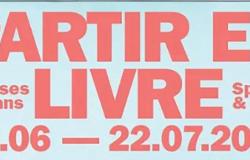After the years of the pandemic, and a very prosperous period in 2021-2022, the situation of French bookstores seems more complex in 2023-2024: is this an impression or a reality?
Anne Martelle: In 2023 and since the start of 2024, activity has barely been maintained. This tense market confirms that we have indeed emerged from the prosperous “post-covid” period.
How do you explain this market contraction observed over the past few months? Is the SLF worried?
Anne Martelle: This is, in a way, a return to normal, the book market being structurally more accustomed to single-digit developments than to double-digit increases or decreases. To the changes in book reading practices measured over the long term are added the current tension in the purchasing power of many French people and a fairly general climate of concern which is rarely conducive to the purchase of books.
The bookselling professions find themselves in a difficult situation: on the one hand, still low margins, on the other, unattractive salaries for employees, despite qualified and demanding jobs. Do you fear for the attractiveness of the sector? What would be the ways to improve it?
Anne Martelle: I would have a less definitive judgment. We have never created so many bookstores in France and the number of young people wishing to join our training courses, particularly those at the Bookstore School, has never been so high. The bookseller profession is therefore very attractive, even more so than in the past.
The difficulty is keeping these young people over the long term when the salaries they can expect elsewhere are higher. This is why we explain to our professional partners and the public authorities that it is imperative to implement measures allowing bookstores to increase the level of remuneration so as not to lose our talents. The strength of bookstores, which explains why they manage to sell new releases or seminal books that are rarely sold elsewhere, is the skills of booksellers. And this skill comes at a price.
Why do large stores which devote only 10% of their turnover to staff, compared to 15 to 20% in bookstores, depending on the size, have commercial discounts higher than ours? The logic of Lang law would have it be the opposite.
The SLF and other bookstore organizations are questioning the eco-responsibility of the bookseller: do you believe that there is still much progress to be made? Can a bookseller be eco-responsible if the book industry is not? What is your view on the more interventionist initiatives put in place by certain booksellers, such as the “truce of new releases” put forward by the Association for Book Ecology?
Anne Martelle: Even if all studies show that the environmental impact within the book industry is overwhelmingly attributable to upstream manufacturing activities, booksellers must do their part of the work. They are very mobilized on this subject.
We are going to look at the results of the experiments launched by some booksellers to slow down the infernal and, in the literal sense of the term, quite “stupid” flow of new releases. Beyond the ecological waste caused by this overproduction, we sense a general exhaustion among booksellers in the face of these incessant waves of new releases.
The best way to defend editorial creation and authors is to publish less and allow everyone, publishers, representatives, booksellers to take better care of books by devoting more time and attention to them. Ultimately, overproduction harms diversity.
With the paper crisis, then inflation, book prices increased considerably. Do you think deflation is possible, or desirable?
Anne Martelle: In 2023, book prices increased by an average of 3.5%, including 5.4% for paperback, while inflation was 4.9% and we are coming out of two decades where book prices have steadily fallen relative to the cost of living. I would therefore not speak of a “considerable increase”. Naturally, you have to be careful in this matter. In certain sectors, the room for upward maneuver is very small, in others, adjustments are still possible.
In any case, booksellers’ charges are increasing considerably: since 2021, for example, +10% for salaries, +13% for transport or even +150% for electricity bills for large bookstores. If turnover is not growing, neither are prices and discounts, what do we do?…
The Minister of Culture Rachida Dati wants to open more bookstores, particularly in priority districts of the city. Is the SLF supporting this initiative and, if so, how?
Anne Martelle: We welcomed the minister’s desire to rely on bookstores to further expand access to books, in priority areas of city policy or in rural areas. But you have to look at each case individually. In certain areas, the creation of a new bookstore can fill a void, provided however that the project is economically viable, otherwise it is preferable to set up a library there.
In other cases, the creation of a bookstore, temporarily aided by a subsidy, will weaken the existing network. At the end of the day, no one will win. We therefore indicated to the minister that our priority was to consolidate what already exists, especially since nearly 500 bookstores have already been created since 2019, more than half of which are in villages, towns or small towns of less than 20,000. residents.
What initial assessment does the SLF draw from the Darcos law and the minimum rate of shipping costs? What conclusions does the SLF draw from the IFOP survey commissioned by Amazon, which reveals a contraction in the buyers’ basket, and a fairly weak positive impact of the law, particularly for purchases in bookstores?
Anne Martelle: Even if it is too early to establish an assessment of the measure, the first elements which come back to us show a small drop in shipments, of around 5%, but a clear increase in reservations, of 15 to 30% depending on the bookstore websites. As a matter of principle, we give little credit to studies commissioned and financed by Amazon and do not comment on them.
I would still like to recall some fundamental elements which, unfortunately, receive less attention than these studies. The first is the unanimity of other retailers on the imperative necessity of this law without which any shipment amounts to selling at a loss.
READ – Booksellers demand a “drastic drop in production” of books
The second is that this is a battle to preserve the single price of the book. In the 1980s, Fnac and Leclerc published the same studies that Amazon does today. What would have happened if we had given them credit? This is the question that the entire industry must ask itself.
The possibility of implementing a tax on second-hand books is becoming clearer: is the SLF in favor of it? Should this tax be limited to platforms, according to the union? Does this measure not risk restricting access to books for part of the population?
Anne Martelle: The SLF wants a more global reflection to take place on the creation and sharing of value within the book industry. We will also dedicate a round table to this subject at the next National Bookstore Meetings with authors, the Federation of Independent Editions and the SNE.
This reflection seems to us to be a prerequisite for any proposal, whether it involves finding resources on the fringes of the sector, which is the case with the second-hand market, or within it. And, in any case, any new resources must benefit all stakeholders, including independent booksellers who, as we saw above, really need them.
The CNL regularly measures young people’s disinterest in reading. How does the SLF view these figures? Are they verified in bookstores? How can we encourage young people to go to bookstores?
Anne Martelle: Booksellers strive every day to retain and recruit young readers through their selections, their events, their work with schools, etc. We must not lose hope. It’s not because we swim against the tide that we can’t move forward. But, for this, booksellers must continue to be supported, particularly by the two programs which work very well, the Culture Pass, of course, and Young people in bookstores.
What do booksellers think about editorial concentration? Faced with distributors, are the negotiation margins sufficient?
Anne Martelle: The commercial relationship between booksellers and their suppliers is unbalanced. It is structurally so and concentration can only make it worse. This is why we insist on the qualitative work provided by booksellers to discover works, continue to defend them over time, make people want to read, train new readers… It’s pedagogy . We would like it to be more profitable, that’s true.
We are fierce defenders of the single price of the book. But, in this context, a large part of the economic responsibility lies with publishing-broadcasting-distribution. We too often have the impression, particularly from large groups, that publishing takes the advantages of the single price without assuming the responsibilities attached to it.
Photography: Anne Martelle at RNL 2022, in Angers (ActuaLitté, CC BY SA 2.0)
FILE – An ecology of the bookstore at the heart of RNL 2024






